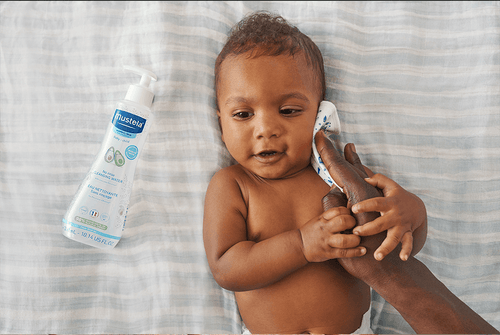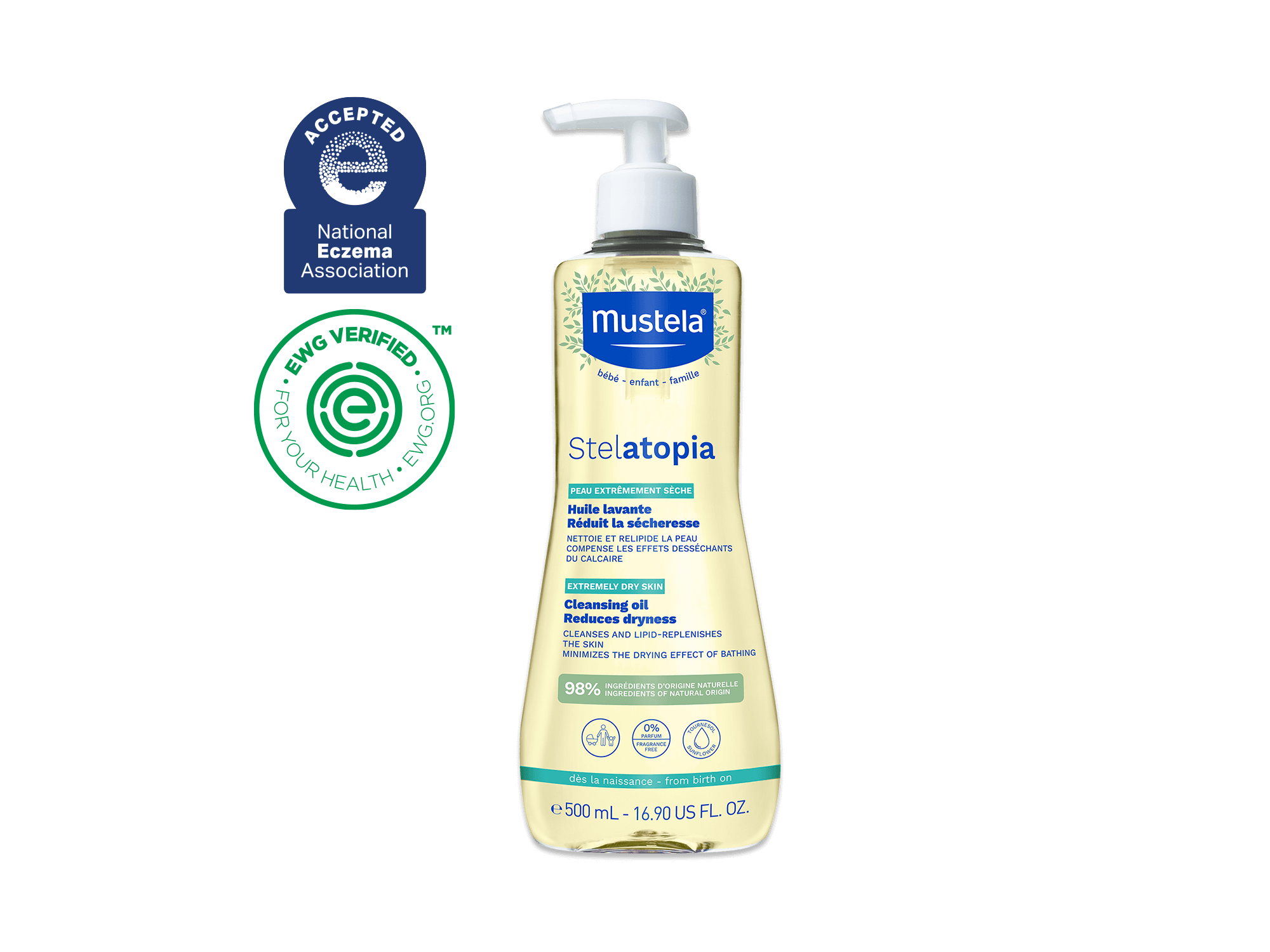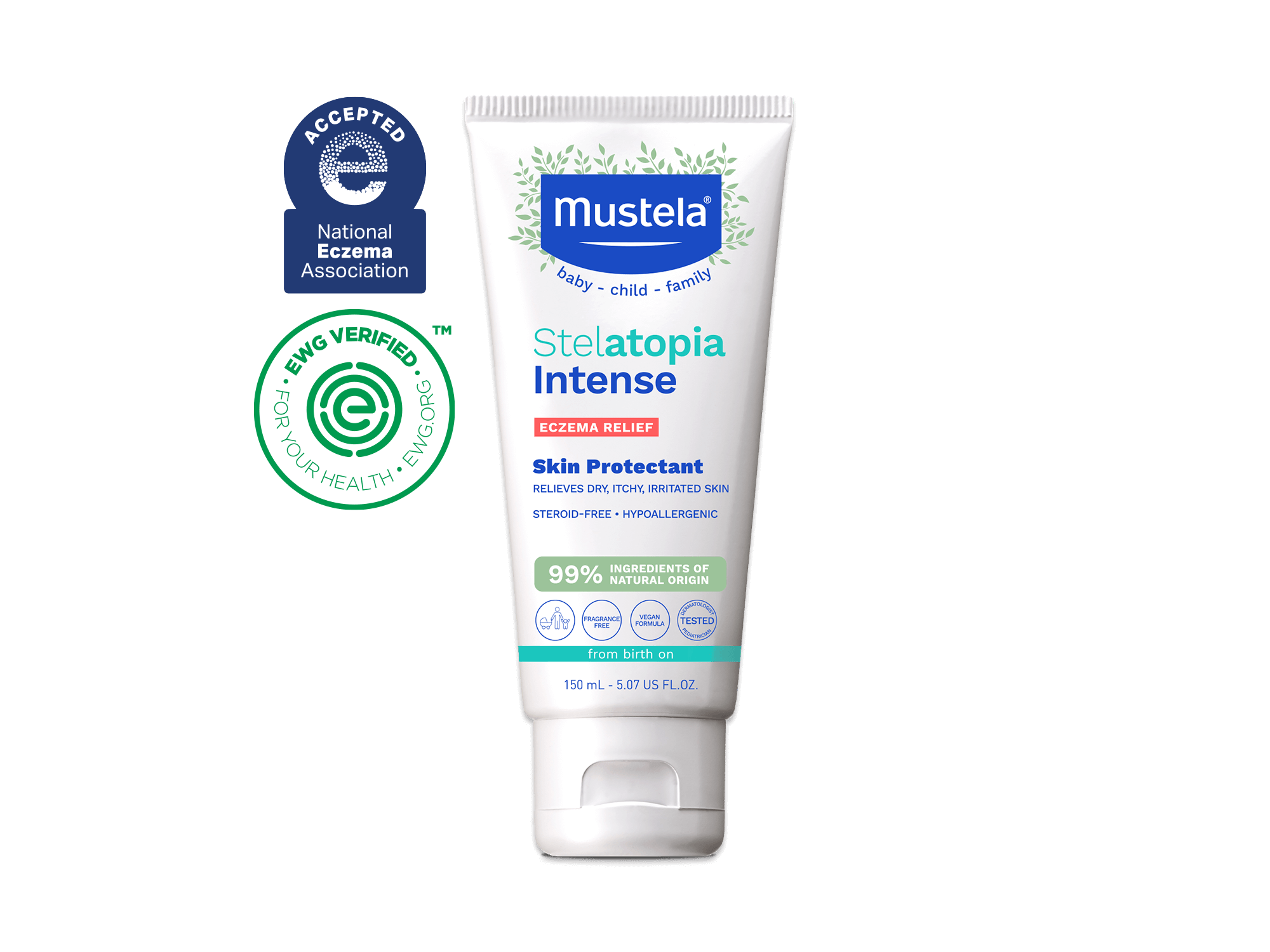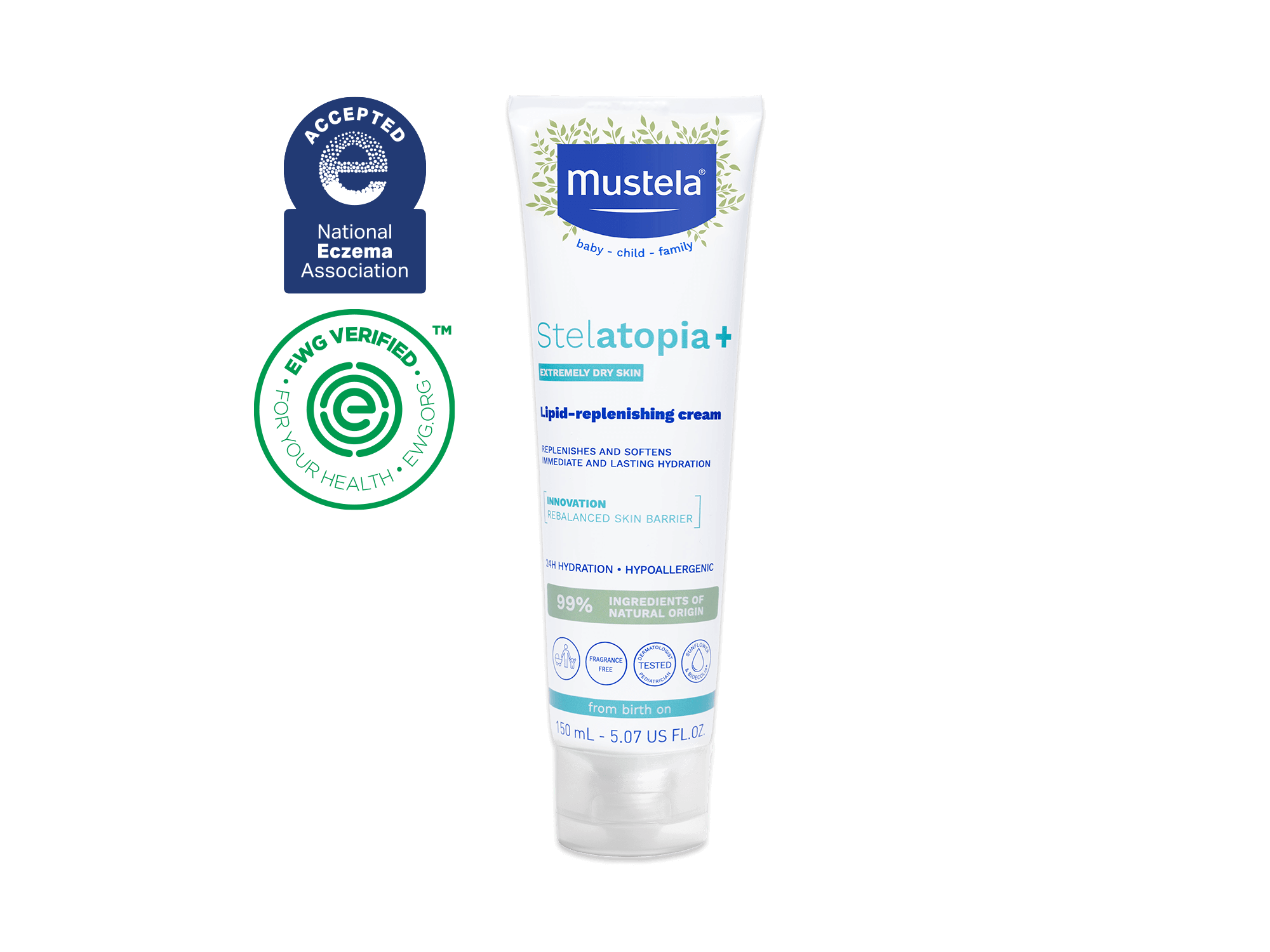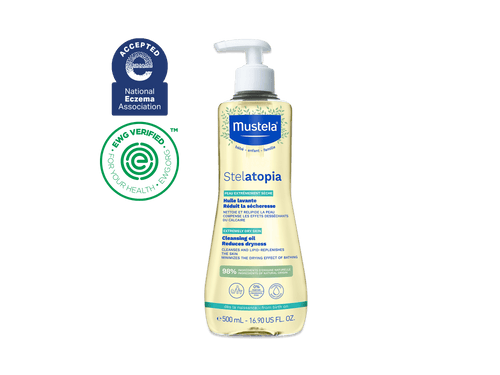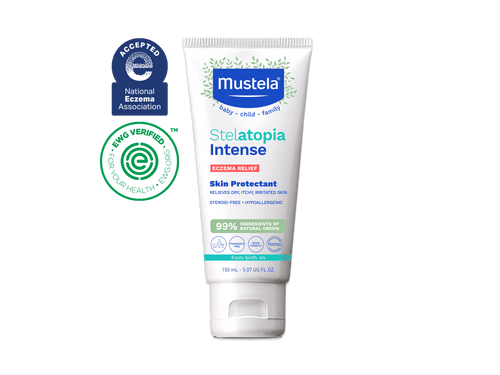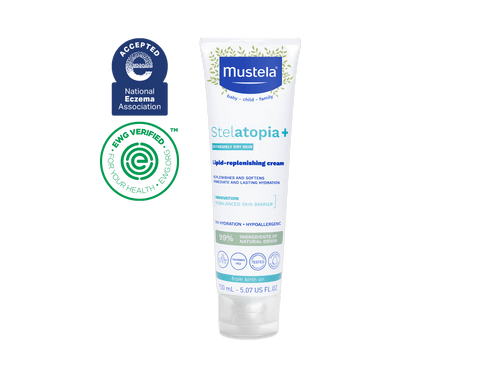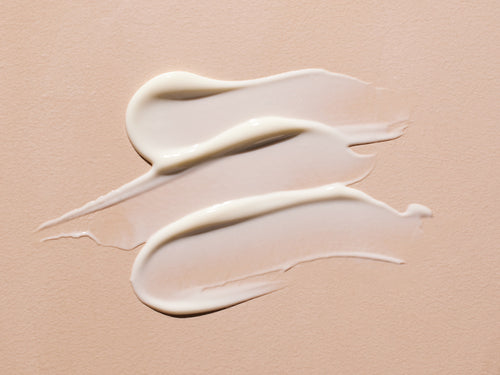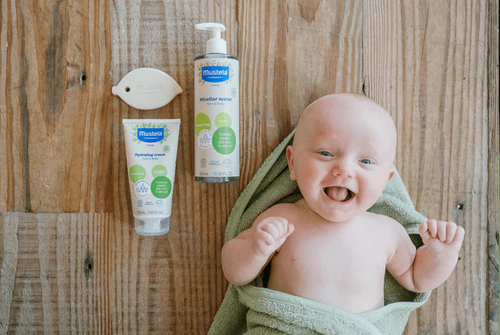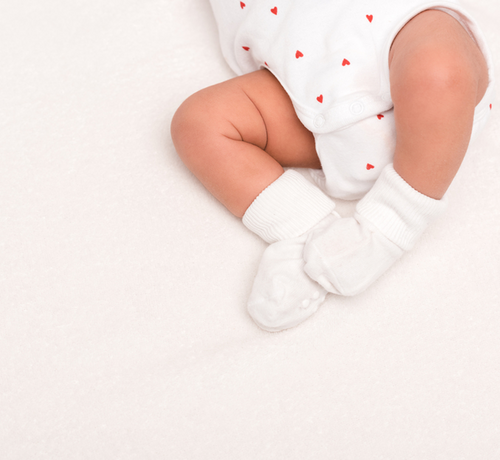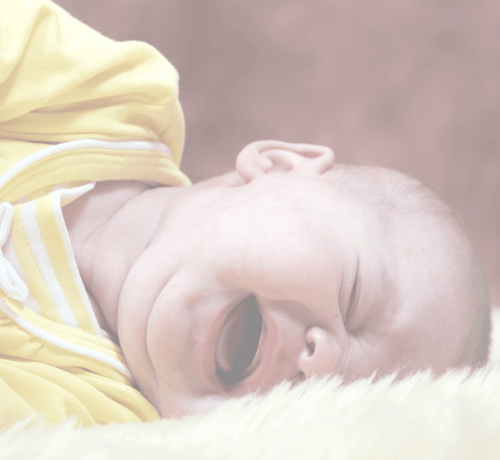Your baby’s first eczema flare-up can come as quite a surprise, especially if neither you nor your partner is familiar with the condition. Where did the red patches on your baby’s skin come from? Should you be concerned? These questions—and so many others—can make understanding your baby’s eczema a fairly difficult process.
In this article, we’ll help you meet the challenge head-on by exposing the 12 most common baby eczema myths.
Myth #1: Eczema Is Caused By A Lack Of Hygiene
Perhaps one of the most important myths to debunk when trying to understand baby eczema is that it’s caused by a lack of hygiene. This myth is 100 percent false. In reality, eczema, often referred to as atopic dermatitis, is an allergic reaction on your baby’s skin to something in their environment. Even the cleanest baby in the most sterile environment can suffer from eczema.
For example, your little one’s flare-up could be caused by something they ate. Or it could be the result of rough clothing material. Any number of factors—other than a lack of hygiene—can lead to an eczema flare-up.

Even your baby’s bath water can trigger an eczema outbreak (and what’s more hygienic than bath time?). In some cases, the chlorine, salts, and other minerals naturally present in your baby’s bath water are enough to cause an eczema flare-up
Additionally, the cleansing products you use on your little one’s skin can trigger an allergic reaction. This is because many baby shampoos and soaps contain harsh chemicals that can irritate already-sensitive skin.
That’s why it’s important to review the ingredients in a product, even a bath product, before using it on your baby. Always select items that are specifically designed for your little one’s eczema-prone skin, like Mustela’s fragrance-free Stelatopia Foam Shampoo.
To further protect against possible irritation caused by bath water, add a drop or two of Mustela’s Stelatopia Bath Oil directly into your baby’s bath water, and wash your little one with Stelatopia Cleansing Gel.
The patented natural ingredients in Stelatopia Cleansing Gel — including sunflower oil distillate, Avocado Perseose, and shea butter — envelop your baby’s skin in a silky, hydrating barrier that protects, moisturizes, replenishes, and soothes dry, itchy skin.
Myth #2: Eczema Is Uncommon In Newborns And Young Children
Eczema affects an average of one in every five children. In fact, it is the most common childhood skin disease on the planet, affecting some 400 million infants, babies, and children. And these numbers continue to grow.
Thankfully, eczema is easy to treat. With the right care, eczema symptoms can improve and even disappear. This, however, doesn’t mean that your baby’s eczema has been cured. Remember, eczema is a reaction to environmental factors, much like an allergy to pollen or animal dander.
Even though your child may be symptom-free for some time, the possibility still exists that their red, itchy, irritated skin can return if they come into contact with whichever allergen caused their skin reaction in the first place.
The understanding that an atopic dermatitis flare-up can happen when you least expect it makes understanding and treating baby eczema even more difficult. Fortunately, there are steps you can take to prevent future outbreaks. The simplest and most effective way to keep eczema flare-ups at bay is by applying a daily emollient treatment and washing with a protective cleanser like Stelatopia Cleansing Gel.
Myth #3: The Milk You Feed Your Baby Can Cause Eczema

As a parent, one of the biggest concerns you’ll face on a daily basis is your baby’s nutrition. While it’s already difficult enough to make sure your baby is getting the vitamins and minerals they need, there is a myth that milk can cause baby eczema.
While there are times when the milk your baby drinks can lead to an eczema flare-up, it isn’t always the case. Here’s what you need to know when it comes to understanding baby eczema and milk.
- Breast milk will not cause eczema. In fact, breastfeeding your baby can actually help reduce the allergic response associated with this form of atopic dermatitis.
- Baby formula can cause eczema flare-ups because it is usually made with cow’s milk or soy milk. If your baby is allergic to one or the other, it may be time to switch.
Myth #4: Eczema Is Caused By Stress
When it comes to understanding baby eczema, the thought that this condition could be caused by stress is worrisome in and of itself. But let us reassure you again that eczema is a reaction to an allergen in your child’s environment. It could be dust, fabrics, food, even the temperature of the house. Stress, though, is never the direct cause of an eczema flare-up.
However, stress can certainly aggravate the situation once it begins. This is because stress releases hormones, like cortisol and adrenaline, that can further harm your baby’s body. If this happens to your little one, do your best to keep them calm. Play with them, cuddle with them, and as soon as possible, explain the skin condition so they know what’s going on.
Myth #5: Eczema Is Contagious
Eczema flare-ups can sometimes look similar to contagious rashes, but rest assured that atopic dermatitis is not contagious. In fact, eczema is coded in your baby’s DNA. Even coming into contact with the most extreme eczema flare-up will not transfer the condition to another person. The only way to pass eczema is from parent to child through genetic material.
Approximately 70% of children affected by eczema have a family member who also suffered from atopic dermatitis. More specifically, if only one parent has atopic-prone skin, there is a 50% chance that the child will develop a similar condition. If both parents have atopic-prone skin (and the propensity for eczema flare-ups), the likelihood increases to 80% (Sources: Böhme 2003, Taïb 2008).
Even if neither you nor your partner has eczema, your baby could inherit the condition from their grandparents (your parents) or their great-grandparents (your grandparents). In fact, there may be no history of eczema in your family and your baby can still develop symptoms. It all depends on how the genes arrange themselves during conception and development.
Myth #6: Eczema Can Cause Other Allergies

Your child may develop other allergies during their life, but they won’t be a result of their eczema. Both eczema flare-ups and the sneezing and watery eyes associated with seasonal allergies (as a simple comparison) are the immune system’s response to an allergen in the surrounding environment.
As such, your child may develop numerous allergies over their lifetime due to their immune system, but they won’t be a result of their eczema.
Myth #6: Your Child’s Eczema Will Develop Into Asthma
There is no direct link between eczema (atopic dermatitis) and the development of asthma. Simply because your baby has eczema doesn’t mean they’ll have asthma later on in life.
The confusion surrounding eczema and asthma is often due to the fact that asthma commonly first appears around the age of two. This is also the time when eczema symptoms tend to disappear. But one doesn’t necessarily lead to the other.
Myth #7: Children With Eczema Are More Likely To Develop Staphylococcus Aureus Or Impetigo
When you see the oozing patches that can result from an eczema flare-up, it’s easy to worry. But there’s really no need to.
A child with normal skin is equally as likely as a child with atopic-prone skin to develop staphylococcus aureus and impetigo. In fact, the presence of staphylococcus under the skin is normal for all skin types. That’s right, this bacteria is part of your skin’s natural flora.
The thing that causes parents to panic is that the bacteria is more concentrated when inflammation occurs (such as inflammation caused by an eczema flare-up). Fortunately, the mere presence of this bacteria, even in high numbers, doesn’t necessarily trigger an infection. That’s not to say it can’t happen—it can—but if eczema flare-ups are properly treated, infections are rare.
Myth #8: You Should Use Only Natural Plant Ingredients To Treat Your Baby’s Eczema
Unfortunately, “natural” doesn’t necessarily mean harmless. Plant-based ingredients can cause allergic reactions similar to those caused by common allergens such as dust, dander, and harsh soaps—often leading to an eczema flare-up. And because your baby’s skin is atopic-prone, it needs extra-special care.
The best kind of extra-special care you can give your little one is the daily application of an emollient product, like Mustela’s Stelatopia Emollient Cream or Stelatopia Emollient Face Cream and the replacement of harsh bath soaps with a gentle cleanser like Stelatopia Cleansing Gel.
Mustela’s specially designed formula is safe enough to start using the day your baby is born. And it’s powerful enough to help prevent future eczema flare-ups.
Expert tip: To help further relieve eczema-prone skin, dress your baby in Mustela's Stelatopia Skin Soothing Pajamas after using our Stelatopia bath and skin-care products. Made with high-quality ingredients, these pajamas deliver skin-soothing moisture all night long so your baby can rest well.
Myth #9: You Should Avoid Using Topical Steroid Creams On Your Baby’s Skin

Steroids have gotten a bad reputation in the media. But the steroids that athletes take—the ones that caused all the uproar—are vastly different than the steroid creams used to treat rashes and skin irritation.
These creams are called corticosteroids. They contain the hormone cortisone, which is a natural chemical produced by the adrenal glands in your body. The purpose of cortisone is to suppress your immune system.
While suppressing your immune system may sound like a bad thing, it’s actually beneficial in the case of eczema. It helps reduce your little one’s inflammation, pain, and swelling. And perhaps the best thing about steroid creams is that their effects are localized. The decrease in immune response (swelling, pain, etc.) occurs only in areas where the cream is applied.
Steroid creams (if prescribed by a doctor) can make a nice addition to a daily emollient skin care product like Mustela’s Stelatopia Emollient Cream to help reduce stubborn flare-ups. Topical steroids shouldn’t replace your regular treatment for atopic-prone skin and eczema (atopic dermatitis), but they can be used once in awhile to reduce pain and itching and help your baby enjoy a better quality of life during flare-ups.
Myth #10: You Shouldn’t Let Your Child Go Swimming
Both saltwater and chlorinated water can trigger eczema flare-ups because they each have a tendency to dry out sensitive skin. But swimming is actually an ideal activity for those with eczema-prone skin because it reduces sweating and minimizes itching.
That said, it’s important to take a few preventative measures before venturing into the pool or ocean with your baby.
- Apply emollient products, like Stelatopia Emollient Cream and Stelatopia Emollient Face Cream, to set up a barrier between your baby’s skin and the chemicals in the water.
- Apply a mineral-based SPF 50 sunscreen that is suitable for atopic-prone or dry skin.
If you spend all day at the pool or the beach, be sure to re-apply both the emollient cream and the sunscreen every two hours or after getting your little one out of the water.
Additionally, if you’re concerned that bathing will affect your child’s eczema, add a drop of Mustela’s Stelatopia Bath Oil to the water and wash them with Stelatopia Cleansing Gel to help prevent flare-ups.
Myth #11: Your Baby Shouldn’t Go To Daycare When They Have A Flare-Up
Earlier we explained that eczema is a genetic condition and is therefore not contagious. That being said, there’s no reason to keep your child at home when they have a flare-up. Their irritated skin is the result of an allergic reaction, just like your tendency to sneeze when the pollen count is high. Your pollen allergy symptoms aren’t contagious, and neither is the redness and swelling on your little one’s skin.
If you’re unsure about taking your baby to daycare during a flare-up, simply explain what’s going on to their caregivers so that they know what to expect. This can also help them understand why your little one might be grumpy and uncomfortable (who wouldn’t be with sore, itchy skin?).
In the case of an extreme flare-up, don’t hesitate to keep your child at home, where you can continue to apply an emollient balm or cream to help relieve their skin irritation. And never underestimate the power of special cuddle time for keeping your child happy despite an eczema breakout.
Myth #12: You Can’t Have Pets If Your Baby Suffers From Eczema

Unfortunately, we can’t fully call this a myth. It’s true that the dander from your cat, dog, hamster, or other furry friend could be a trigger for your child’s eczema. This is definitely not what you want to hear when your dog truly is your best friend.
The good news is that if you already had a pet before your child was born, early contact with the dander (through your body during pregnancy) may have made your little one immune. The best thing to do is consult your physician, who will run tests to determine what sets off your baby’s allergies.
If your doctor confirms that your little one is allergic to dander, keep your pet away from certain rooms or set up a pet living space outside. This way, you can enjoy your pet without worrying about what his dander is doing to your baby.

